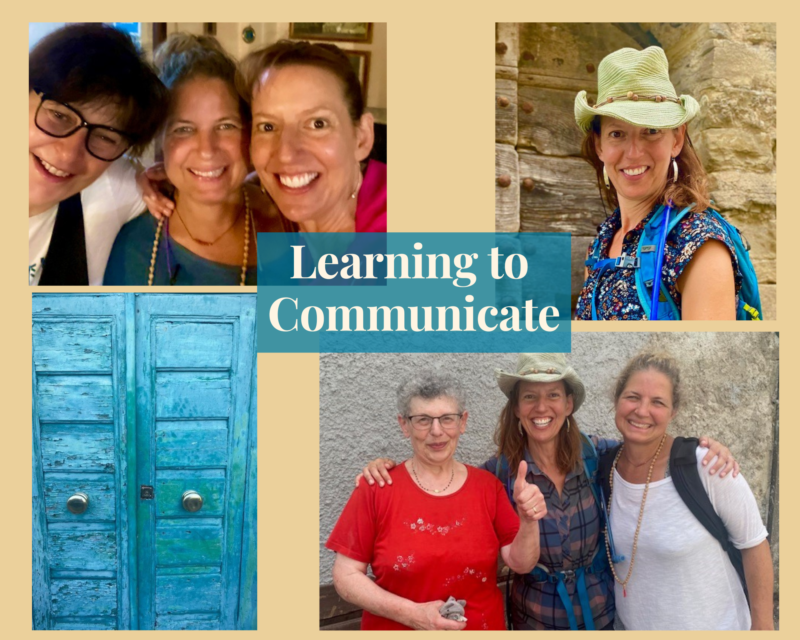Learning to Communicate

by Julie Lancaster View Bio
BEING SCRAPPY
I love learning languages. In college I took all the offered classes of Spanish and Swahili, and later, plastered my outhouse in the Peace Corps with weekly updated Sesotho words. My learning style is to learn the concepts and big-picture ideas first, and then the details. I want to understand how to conjugate, how to pronounce letter combinations, sentence structure.
Here, amongst the ravioli and olive oil and town church bells, my Italian studies have been scrappy. I’ve never taken a class or had a formal teacher. I have tried to figure out the concepts while communicating with the locals. Before boarding the plane Europe-bound, I wanted to at least be prepared with a few practical phrases. I tried a few weeks of Duolingo, but I did not learn language rules or travel-Italian, but did learn to say, “I like sugar.” And “I have a sock.”
Two weeks, in on-the-ground learning, here’s what I have gleaned so far:
THE G
I think the G is usually silent, or a GN turns into Ñ. GL sounds like Y. GIU is pronounced jew (Giulia – that’s what I say my name is).
THE PLURAL
If the singular is O, the plural is I (biscotto/biscotti). And A in the plural turns to E (pizza/pizze).
SYLLABLE EMPHASIS
If you put the emphasis on the wrong syllable, people won’t understand you. It seems common to put the emphasis on the second syllable, but only about half the time. Haven’t totally figured this out yet. (PonTREmoli-the town we are hiking to.)
GOOGLE TRANSLATE SOMETIMES ISN’T HELPFUL
Looking at the menu, I am still not sure what “red bumps” was as an entrée.
FALSE COGNATES
We’ve tried to use context clues and at times but have been fooled often. Granite is not a type of rock, but a frozen slushy. And when they took us to our Camera, it was not to a photoshoot, but to our Room. And Terrificante is not terrific, but terrifying. Not the best compliment for a homemade meal.
WHERE I AM FROM
I’ve tested out a few responses to the question of which country I hail from. The United States gets a puzzled look. So does The States. And USA. Finally, America is the understood winner (with the rolling of the R).
C/S/K ORDEAL
The CH sounds like K, but CC sounds like CH. SS sounds like SH, and C sounds like CH, unless it’s the first letter. And CCH sounds like K (pistacchio). This all seems a bit excessive and intentionally convoluted to confuse the Americans.
THE BUMPY ROAD TOWARD COMMUNCATION
Today, we caught a 1-hour lift with the innkeeper’s father. Sitting up front with him, I was ready to commune. I was having deep thoughts like, “Oh wow-the forecast has rain expected-80% today. Is it common here for people to still hike or work in the fields in the rain, or does everything come to a halt? Do people celebrate or dislike the rain around here?” Even though I desperately wanted to dive into all of it with him, all I could say in Italian was, “Rain.”
He proceeded to graciously respond to my one-word prompt with a paragraph. I laughed and nodded along and understood nothing.
UNINTENDED HUMOR
The other day I was feeling gregarious and asked someone we were sitting by if he spoke English. After he said yes, some; I wanted to ask about how you say the multiple varieties of Excuse Me (expressing apology for bumping into someone and getting someone’s attention). I feel a little confused about it in Spanish, so I thought I’d get a head start by asking out of the gate. I was trying to explain what I meant but clearly wasn’t being clear. So, I thought a demo, like charades, would be helpful to show what I meant by “bump”. As I started to stand, my legs somehow got tangled. I lunged toward him, he caught me in the most awkward hug, and I almost clumsily brought both of us to the ground. I wanted to run and hide, but instead, gained my composure and said, “That! What if I do that?” And he taught me the words. He proceeded to ask “why are you so interested in knowing what to say for this. Do you do it often? Are you dangerous?” Well, I suppose perhaps I am.
When one of our B&B hosts was giving us the rundown of the place, she said, “Breakfast is at 8. I am ham.” And we knew just what she meant.
At a pizzeria, I asked, in Italian, what was on the vegetarian pizza. He answered, in English, eggplant, zucchini, pepperoni. Confused and tickled, I ordered it. Peppers.
Then there was the other foreigner in front of us getting coffee and he ordered a “latte” and was disappointed when the order came out: just a cup of steamed milk.
A woman was trying to tell us that she also likes walking in the mountains, but she had this brace on her ankle due to a recent accident with a “canne grande.” Quick on the draw with pulling out Google Translate, I discovered that she had an incident with a “large reed.” Definitely possible, I thought. Then she showed us a photo of what she was talking about. Her dog. Take 1 N out to have “cane” and it’s a totally different word.
And the list of stumbling through communication goes on. It is joyful and humbling. In this process, I’ve made a list of useful short phrases & words that I would always like to learn in a new language, and I’d love to share them with you for your next travel adventure.
SENTENCES
- Are you open?
- At what time?
- Can I have…the bill, etc.
- Come here.
- Do you speak English?
- Excuse me (Can I get your attention AND sorry I bumped you).
- Give me five.
- Give it to me.
- Here we are.
- How beautiful.
- How do you say…in (language)?
- How many minutes?
- How much does it cost?
- I am learning (language).
- I am/my name is…
- I don’t know.
- I don’t understand.
- I love you.
- I would like…
- Is that right?
- Is there/do you have…
- Let’s go.
- Me? For you.
- Pleased to meet you.
- Ready?
- What is this?
- What is your name?
- Where are you coming from?
VOCAB
- 1-10, 20, 30, 50, 100
- Bathroom
- Big, small, a little
- Coffee with milk
- Days, weeks, months
- Good morning, good evening, good night, greetings
- Hot, cold, tired, hungry, full, happy, sad, sick
- More
- My friend
- Near, far, over there
- One moment
- Only
- Perfect, delicious
- Please
- See/look
- Speak/talk
- Thank you very much/you’re welcome & welcome
- The same
- Today, tomorrow, yesterday
- Why, what, who, when, how, how much is, where is
- Yes/no, of course
- You, me
- Young, old
MORE BLOG POSTS
Failure: The Main Ingredient for Confidence Building
When my seventh-grade summer arrived, I could hardly wait. I was excited to play endless video games, wake up whenever and go to the beach. Turns out my Dad had …
Exemplary Leader Spotlight: Nicole Kiddoo
Exemplary Leader Spotlight Each month, we are highlighting one member from the Group Coaching Intensive for Leaders of Leaders. We believe in learning from our community, and this month, Nicole …


